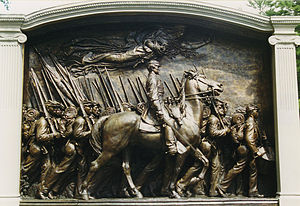Robert Gould Shaw Memorial
 |
|
| Artist | Augustus Saint-Gaudens |
|---|---|
| Year | 1884 |
| Type | Bronze |
| Dimensions | 3.4 m × 4.3 m (11 ft × 14 ft) |
| Location | Boston, Massachusetts, U.S. |
| 42°21′27″N 71°3′48.6″W / 42.35750°N 71.063500°W | |
| Owner | National Park Service |
The Memorial to Robert Gould Shaw and the Massachusetts Fifty-Fourth Regiment is a bronze relief sculpture by Augustus Saint-Gaudens at 24 Beacon Street, Boston (at the edge of the Boston Common), depicting Col. Shaw and the 54th Regiment Massachusetts Volunteer Infantry, marching down Beacon Street on May 28, 1863. It was unveiled May 31, 1897.
In the autumn of 1865 a meeting was held in the council chamber at the State House, at the call of Governor Andrew, Dr. Samuel G. Howe, Senator Charles Sumner, Colonel Henry Lee, Mr. J. B. Smith, and others, to consider the matter of a suitable memorial to Robert G. Shaw, the late commander of the Massachusetts Fifty-fourth Regiment. The prime mover in this matter was doubtless the late Joshua B. Smith, a fugitive from slavery, who after his escape had been in the service of Colonel Shaw's family before he took the position of repute as the successful caterer, in which he became so well known in Boston. The purpose of the meeting was declared in the following words:
"The monument is intended not only to mark the public gratitude to the fallen hero, who at a critical moment assumed a perilous responsibility, but also to commemorate that great event, wherein he was a leader, by which the title of colored men as citizen-soldiers was fixed beyond recall. In such a work all who honor youthful dedication to a noble cause and who rejoice in the triumph of freedom should have an opportunity to contribute."
An inscription on the relief itself reads OMNIA RELINQVIT / SERVARE REMPVBLICAM ("He left behind everything to save the Republic"). The pedestal below carries lines from James Russell Lowell's poem "Memoriae Positum":
Right in the van of the red rampart's slippery
swell with heart that beat a charge he fell
forward as fits a man: but the high soul burns
on to light men's feet where death for noble
ends makes dying sweet.
On the rear are the words of Charles W. Eliot:
The White Officers taking life and honor in their hands cast in their lot with men of a despised race unproven in war and risked death as inciters of servile insurrection if taken prisoners besides encountering all the common perils of camp march and battle. The Black rank and file volunteered when disaster clouded the Union Cause. Served without pay for eighteen months till given that of white troops. Faced threatened enslavement if captured. Were brave in action. Patient under heavy and dangerous labors. And cheerful amid hardships and privations. Together they gave to the Nation and the World undying proof that Americans of African descent possess the pride, courage and devotion of the patriot soldier. One hundred and eighty thousand such Americans enlisted under the Union Flag in MDCCCLXIII-MDCCCLXV.
...
Wikipedia
